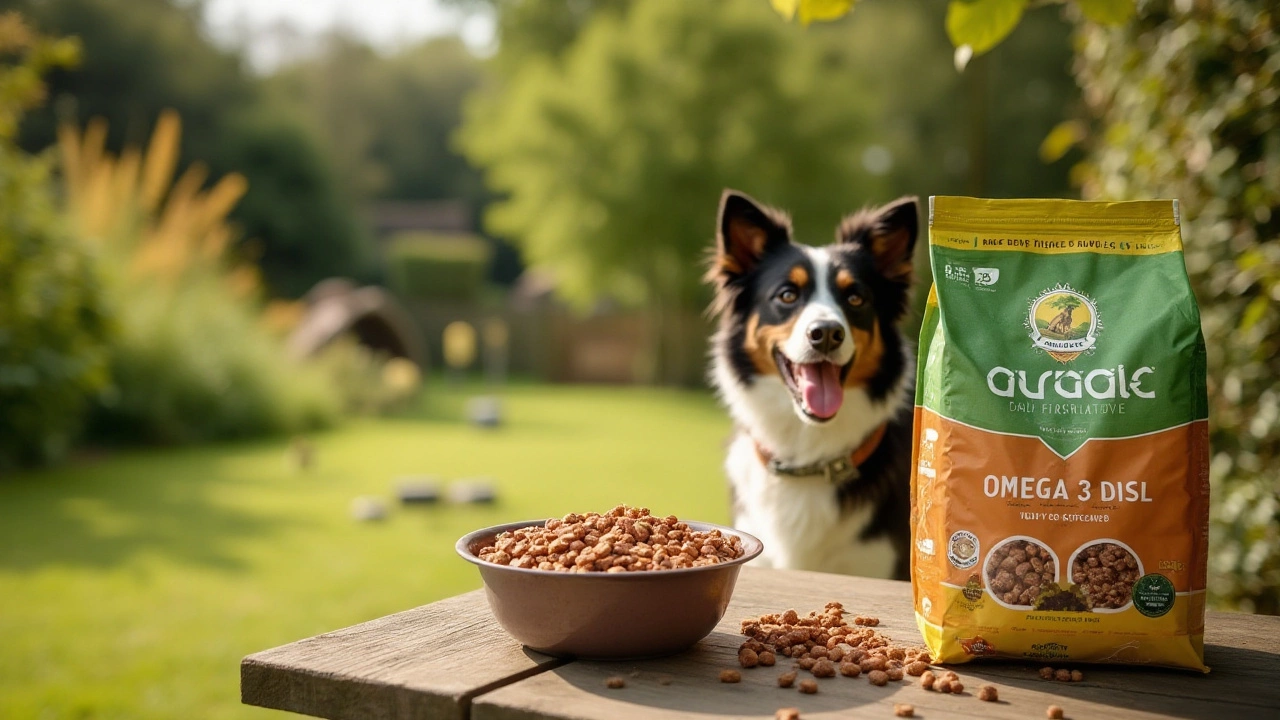Choosing the right protein for your dog can sometimes feel like navigating a maze. With so many options and opinions, the task might seem overwhelming. But ensuring your canine friend gets the safest and most nutritious proteins is essential for their overall health.
Let's explore what makes certain proteins stand out and why they're considered safe. We'll discuss the top choices and look into how supplements might play a role in your pet's diet. By understanding what’s in your dog’s meal, you're taking a vital step in promoting their well-being.
- Understanding Dog Protein Needs
- Top Safe Protein Sources for Dogs
- Protein Supplements: Are They Necessary?
- Balancing Protein in Your Dog’s Diet
Understanding Dog Protein Needs
Proteins are the building blocks of life, and they play a similarly vital role in the life of your furry friend. The right protein helps your dog build muscles, maintain a healthy coat, and support overall bodily functions. While humans can discuss their dietary needs, it falls on us, the pet owners, to ensure our dogs receive everything they require in their meals. Understanding what these proteins do and why they are necessary can transform your pet’s health and happiness.
The nutritional needs of a dog vary greatly with age, breed, size, and health status. Puppies, for instance, require more protein compared to adult dogs due to their rapid growth and development. On the other hand, senior dogs might need more specialized diets that focus on maintaining organ function and preventing muscle loss. Your active furry athletes, like border collies or retrievers, demand a higher protein intake to sustain their energy levels. It's crucial to know the unique needs of your dog so that they can thrive with the right amount of nutrients in their diet.
Protein sources can range from animal-based to plant-based. The most common are chicken, beef, fish, and lamb. These safest dog proteins not only provide high biological value but are also rich in essential amino acids needed by your dog's body. Animal proteins are considered superior in terms of digestibility and absorption. For instance, fish serves as a fantastic choice, being high in omega-3 fatty acids that especially boost skin and coat health. Plant proteins, like those from beans and lentils, can supplement and diversify the protein intake, but they should be used carefully, as they might not offer the complete amino acid profile required by dogs.
"The primary source of protein for dogs should come from quality animal proteins," says Dr. Jane Doe, a renowned veterinary nutritionist. "However, including a small number of plant proteins can help meet certain dietary needs without overloading on animal sources."
An interesting metric to note is the biological value of the protein source. This measure refers to how efficiently a creature utilizes protein in its diet. Eggs hold the pinnacle biological value and are considered 'complete' proteins, whereas plant sources like wheat and corn rank lower. Balance is vital, and while it's essential to provide the best protein for dogs, it's equally important to ensure they are digesting and using it effectively. Ensuring your pet gets the highest quality protein doesn't just fill them up - it nourishes them.
Engage in discussions with your vet before switching or starting a new diet plan for your dog. This step is crucial to avoid potential allergies or digestive issues stemming from new protein introductions. Every dog's needs are unique, and while we can draw general lines about protein requirements, customization is key. Dogs with certain medical conditions may require specific proteins or amounts thereof. Just like people on specialized diets, your dog needs thorough nutritional assessment to thrive. The good news? With the appropriate knowledge, you can make informed decisions ensuring your pet's well-being.

Top Safe Protein Sources for Dogs
When it comes to selecting the right protein for your canine companion, it's crucial to consider factors like digestibility and nutritional value. One of the top choices, particularly praised for its high protein content and amino acid profile, is chicken. Dogs usually respond well to chicken, making it a staple in many commercial dog foods. Not only is it readily available, but it's also affordable, making it a favorite among pet owners. When fed cooked and without any seasonings, chicken can offer a nutritious boost to your pet's diet. Remember, the simplicity of chicken allows dogs to easily digest it while getting the necessary proteins their bodies require for strong muscles and overall health.
Another well-known safe protein source is fish, particularly salmon and sardines. Rich in omega-3 fatty acids, these types of fish provide canine nutrition benefits that support your pet's coat health and cognitive function. Fish is often recommended for dogs with allergies to common proteins like beef or chicken. When choosing fish, ensure it's properly cooked and deboned to prevent any health risks. Fish-based diets are often more hypoallergenic, making them a preferable choice for sensitive dogs. Now, isn’t that a catch?
Beef is a classic protein source that delivers not only on taste but also on a well-rounded nutritional profile. Most dogs seem to enjoy it, and it provides essential nutrients. However, it’s crucial to consider the source, as beef from grass-fed cows tends to have a higher nutritional value. Pay attention to your dog's response to beef; while it is widely accepted, some dogs may have specific beef allergies. A varied diet is the key to preventing potential allergic reactions.
Lamb and venison are other options worth considering, particularly for dogs that might suffer from allergies or intolerances to more common proteins. These meats are excellent alternatives due to their distinct protein properties and lower likelihood of triggering allergies. They also provide a variety of vitamins and minerals necessary for your dog's health. Just remember, introducing new protein sources should be done gradually to monitor your pet’s reaction. It's wise to initially serve a small portion and keep a close eye on any symptoms of intolerance.
According to Dr. Karen Becker, "Variety is important for a well-rounded diet. Dogs don't just rely on one nutrient source in the wild, so providing different protein sources can ensure they get a broader range of nutrients."
Finally, dog health supplements that incorporate protein elements such as spirulina or chia seeds may also enhance your pet's diet. These are especially valuable in supporting digestive health and maintaining energy levels. While not traditional protein sources, they offer an excellent supplement to conventional protein meals. It’s the combination of these diverse yet safe proteins that ultimately provides a well-balanced diet for your beloved pooch.

Protein Supplements: Are They Necessary?
When it comes to nourishing your furry companion, understanding whether protein supplements are a necessary part of their diet can be a bit confusing. Many pet owners find themselves wondering if their dogs really need supplements when they’re already feeding them high-quality food. While it might seem easy to skip additional supplements, the truth is, what your dog eats plays a pivotal role in their health, energy levels, and overall happiness. Supplements can sometimes be the secret remedy, especially if your dog has specific dietary needs or health issues. Consulting with a veterinarian is crucial, as they can provide tailored advice about whether supplements would be beneficial or redundant in your dog’s diet.
Not all dogs will require extra protein. Those who eat a balanced diet rich in high-quality protein sources like chicken, beef, or fish usually achieve an excellent nutritional balance through their meals. However, there are always exceptions to the rule, such as dogs with dietary restrictions, allergies, or unique health conditions. For dogs recovering from surgery, lactating females, or extremely active working dogs, the need for supplemental proteins could be legitimate. When that's the case, identifying the right type of supplement becomes crucial. Opt for supplements that are high in quality, free from fillers, and ones that provide proteins derived from reliable sources.
How to Choose Protein Supplements
Choosing the right protein supplement for your dog involves more than just picking up a random product off the shelf. It requires an understanding of what the supplement contains and how it complements your dog's existing diet. Look for options that list safest dog proteins as their primary ingredient. It's also beneficial to check if the supplement has undergone any quality testing or certification from veterinary associations. Keeping an eye on your dog's response after introducing supplements is important too, as this will help you notice any adverse reactions or health improvements.
“The right supplements can bridge nutritional gaps that are hard to fill with regular meals. However, they should not be the main source of essential nutrients.” – Dr. Mark Weston, Veterinary Nutritionist
While supplements are not always necessary, they can be a great addition in specific situations. For instance, dogs that are picky eaters, have medical conditions requiring a higher protein intake, or suffer from nutrient absorption problems, can greatly benefit from carefully selected supplements. It’s crucial to remember supplements should never replace whole meals. They are meant to enhance, not substitute, the nutrition your pet receives. Monitoring supplement quantities is also crucial as excessive protein can overload their kidneys, doing more harm than good. Always start with a smaller dose and adjust based on observed results, keeping your vet informed.
Final Thoughts
Ultimately, the necessity of protein supplements boils down to the individual needs of your dog and a careful assessment of their current diet. It is about striking a perfect balance and ensuring all bases are covered. By maintaining open communication with your veterinarian and staying informed about your pet’s specific needs, you can make the best decision for your beloved canine friend. Ensuring their diet is wholesome and meets all their nutritional needs is the key to their vibrant health and joy.

Balancing Protein in Your Dog’s Diet
Achieving the right balance of protein in your dog's diet is crucial for their health, energy levels, and longevity. It's not just about feeding them any type of protein but rather choosing the safest dog proteins that will support their unique needs. Every dog is different, and factors such as age, breed, weight, and activity level can significantly impact their dietary requirements. For dogs that are highly active, like those involved in agility sports or long-distance hiking, their protein needs might be more substantial compared to less active dogs. Ensuring they receive the best protein for dogs could mean the difference between a healthy, vibrant lifestyle and frequent vet visits due to malnutrition-related issues.
Protein helps build and repair tissues, supports immune function, and is essential in producing hormones and enzymes. But too much protein, or the wrong kinds, can lead to issues like obesity or kidney stress, particularly in older dogs. It might be surprising to some pet owners that different proteins digest at different rates and offer varying amounts of amino acids, the building blocks of life. Striking the right balance calls for a keen understanding of these differences and tailoring their meals to meet these specifics. A great starting point is observing how your dog reacts to their current diet; signs of excessive panting, restlessness, or unusual lethargy could suggest an imbalance that needs addressing.
Veterinarians often recommend combining high-quality animal proteins with plant-based proteins to create a well-rounded diet. Meat sources like chicken, turkey, and lean beef are popular and beneficial because they offer complete proteins, meaning they contain all the essential amino acids. Plant proteins, such as those from beans and lentils, while not complete alone, can complement animal proteins and add fiber and other important nutrients to the diet. Quinoa, for instance, is an excellent plant-based protein source that is highly digestible for dogs and can be a valuable addition to any meal plan. Striking the right balance isn’t always apparent at first glance, but with patience and modification, pet owners can create a diet that's as nourishing as it is tasty.
"Protein can be a double-edged sword," states Dr. Karen Becker, a well-known holistic vet and pet health advocate. "Too little of it, and you risk your dog not getting the right nutrients, but too much, especially of a low-quality source, and you can end up with an entirely different set of problems.”
To help pet owners, many commercial dog food brands provide a percentage analysis of their protein content, but not all proteins are created equal—or priced equally. The trick is to look beyond the numbers and understand what these proteins will offer nutrition-wise. Also, be aware of dog food brands that might use fillers or non-specific meat meals. Reading labels carefully can prevent the pitfalls of poor protein sources. It's not uncommon to see vague terms like "meat meal" or "by-product"; it's best to stick with foods that clearly list their protein sources and ideally complement them with fresh foods that you can trust. As a responsible dog owner, research and vigilance are key components to ensuring your pet gets a fair share of this essential macronutrient.
| Protein Source | Digestibility | Amino Acids Content |
|---|---|---|
| Chicken | High | Complete |
| Lentils | Moderate | Incomplete |
| Quinoa | High | Complete |
Another tool dog owners can consider is consulting with a veterinary nutritionist who can assess your dog's needs and tailor a meal plan accordingly. You can explore whether incorporating additional supplements might benefit your dog, though it's critical to not over-rely on supplements, as they should never replace whole, nutritious meals. By combining both scientific research and an understanding of your specific canine friend’s responses, you can forge a healthy dietary path. This way, both you and your furry friend can enjoy the journey together without worrying about diet-related hiccups along the way. With these approaches, you can pinpoint what truly keeps your dog not just surviving, but thriving.
